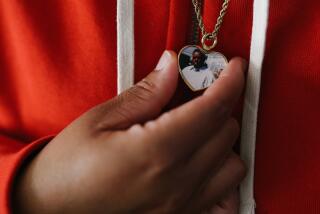Judge Rules ACLU Can See Medical Files in 9 Jail Deaths
LOS ANGELES — A federal judge ordered Orange County officials Monday to release all medical records and coroner’s reports about the deaths of the nine male inmates of the Orange County Jail who have died in the last 17 months. U.S. District Judge William P. Gray ordered the records released over the strenuous objections of an Orange County deputy county counsel who insisted that release of the records would violate the privacy rights of the dead men.
The records are being sought by the American Civil Liberties Union in a pending civil-rights suit that attacks overcrowding and other allegedly unconstitional conditions at the jail.
Deadline Set
Gray gave Deputy County Counsel Edward N. Duran until Friday to turn over the records to Dr. Armon Toomajian, former chief physician at the Los Angeles County Jail. Toomajian is serving as the ACLU’s expert medical witness in its suit. Toomajian and ACLU attorney Richard P. Herman will be the only ones permitted to review the records under Gray’s order.
Duran said he would appeal the judge’s ruling, noting that he does not believe Gray has jurisdiction over medical practices at the jail in this case.
During the past 12 years, the ACLU has filed numerous lawsuits against Orange County and its officials, alleging a wide range of civil-rights abuses of inmates at the jail. These include overcrowding, lack of beds, inadequate food and harsh disciplinary actions. Both Duran and Herman have fought each other in the jail lawsuits for years.
That enmity boiled to the surface Monday, and the two lawyers became so visibly rude that Gray at one point said, “I wish you would both stop throwing dead cats at each other.”
Nevertheless, the heated exchanges between Duran and Herman continued. The attorneys abandoned normal courtroom courtesies and, instead of handing documents back and forth, flung them at each other.
Review to Be Sought
After the ruling, Herman said he would seek a “full-scale review” of medical conditions at the jail.
During the arguments before the judge, Herman quoted from an April 24, 1987, letter to Sheriff Brad Gates from an ad hoc committee formed by Gates and charged with reviewing jail deaths. The letter referred to the three most recent deaths, those of Arthur Oviedo on Jan. 31, 1987, who was strangled in the jail’s medical unit; John F. Wilcox, who died Jan. 17, 1987, after being attacked by a fellow inmate; and Juan Ceja, who committed suicide in March, 1987. The three deaths are still under investigation by the Sheriff’s Department.
“I strongly believe the cause of death was encouraged by lack of care,” wrote Dr. David Powers, chief of medical services for UC Irvine, regarding the death of Wilcox.
“We will contact the medical community suggesting the medical care in the jail is not up to snuff,” wrote Dr. Marshall Houts in another section of the letter. Houts is editor-in-chief of Trauma magazine, a medical journal for emergency room physicians.
At Herman’s request, Gray agreed to tour the medical facilities at the jail May 26. Gray said he will also conduct a hearing on several other jail-related matters during his visit to Santa Ana.
Duran argued in court that Gray, who is handling several related Orange County jail cases, does not have jurisdiction over medical issues.
“Mr. Duran, I think you have a very narrow view with respect to jurisdiction,” Gray said. “If I don’t have jurisdiction, it’s probably a technical matter.”
Gray then suggested, “You can get the Court of Appeals to issue a stay if you like.”
A spokeswoman for the Orange County coroner’s office said a coroner’s report, autopsy and death certificate become public records when a cause of death is determined. However, in murder cases the records remain privileged for a longer period.
Several other issues raised by the ACLU were discussed or decided at the two-hour hearing.
Gray refused to extend inmates’ access to the Orange County Law Libary, saying the current system of inmates’ requesting specific books and materials to be delivered to their cells has improved and should remain in place.
Gray also refused to order jail officials to provide a bed or mattress to new inmates before they are assigned a permanent cell or sleeping area, although he acknowledged that some inmates wait up to 24 hours for a place to sleep.
“It’s unfortunate, and I don’t like it, but I am limited to constitutional deprivations,” Gray said.
He also refused to grant the ACLU attorney’s request for more opportunities to visit and inspect the Orange County Jail.
“I am not disposed to give you carte blanche to prowl around the jail,” Gray said.
More to Read
Sign up for Essential California
The most important California stories and recommendations in your inbox every morning.
You may occasionally receive promotional content from the Los Angeles Times.










